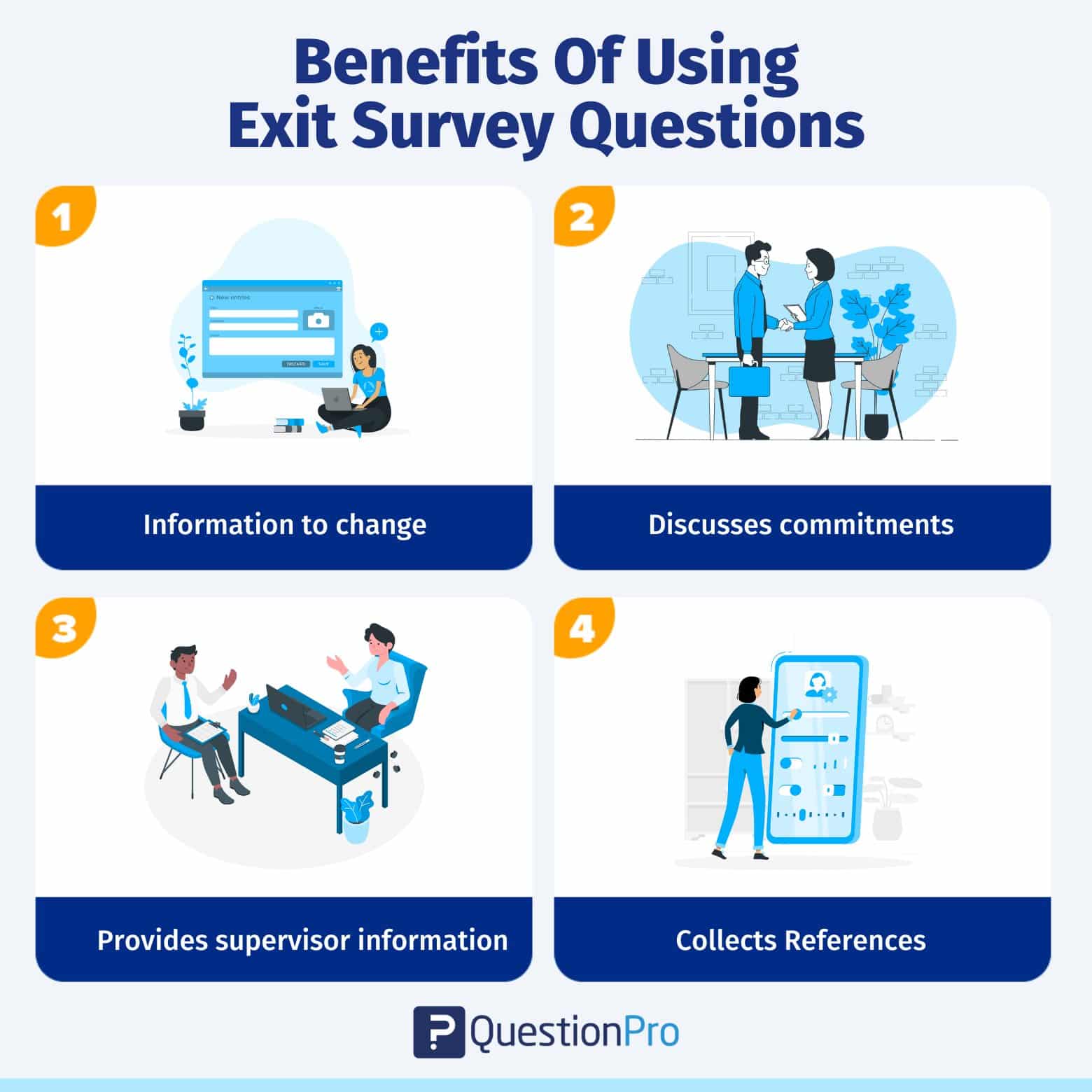

Employers conduct exit interviews when employees decide to leave their job to understand why they are leaving. Exit Survey Questions for exit interviews allow employees to provide feedback and offer recommendations for the company to help them improve.
Hiring top talent is expensive, and getting honest employee feedback can help your organization improve for current and future employees. This employee meeting, part of the offboarding process, allows you to hear from people likely to be the most candid about their experiences with your company.
Organizations must utilize the right exit survey questions to collect important feedback.
Exit survey questions are questionnaires used in the exit process of an outgoing employee. Employee exit surveys, which use exit interview questionnaires as an online survey, allow employees to provide honest feedback effectively.
Employee exit interview questions may vary for different companies, but these question types are most effective when they mix both open-ended and closed-ended questions. These employee survey questions invite current employees to express their opinions about their time in the organization and help them collect insights.
You can use employee opinion survey questions. Those questions provide valuable insights into employee morale, enabling organizations to make informed improvements and foster an engaged workforce.
Here are some of the most useful and best exit interview questions interviewers ask during an exit interview:
This employee exit interview question is essential in capturing the necessary detail of why an outgoing employee (unless terminated) decided to leave their current position. An organization needs to know the reason, understand if there is a pattern, and implement steps to improve employee retention.
Asking this question will help organizations understand employee satisfaction related to training, technology tools, and other attributes that would allow them to perform better in the workplace. Depending on the information obtained, an organization can understand if there is enough scope for learning in the organization.
Teamwork is an important attribute for any organization to excel. Response to this question can lead to a conclusive understanding of the state of teamwork culture in the organization and if measures need to be taken for improvement.
For an organization to function smoothly, it is important that there is a mutually respectful relationship between employees and their managers. An organization that lacks this culture will have a higher employee attrition rate.
The organization can learn what they are doing well and what areas they need to improve for employees to enjoy their job more.
Organizations must know what the employees do not like about their job in general. This information can be compared to the collected data to draw inferences regarding work culture.
This helps employees pen down their issues, things that bother them, and how they can be resolved.
If an employee is an exceptional worker, it is a loss for the organization if they quit. Organizations need to know the alternatives to retain high-performing employees.
It is essential for employees to feel like their hard work is appreciated in the organization; this allows them to feel a sense of belonging and will improve their overall experience in the position. The organization must enhance its culture if employees are unsatisfied with the level of recognition they receive.
According to a QuestionPro study, 17% of employees quit an organization because of poor policies. Response to this question will help an organization determine whether they have robust HR policies through this HR analytics.
Certainly, some organizations have a set KRA for employees when they join an organization. However, over the years, their job description or role might change. Responsibilities can be added or removed. It is important to know whether employees are comfortable with these changes.
Suppose an employee is unable to understand some aspects of their job. In that case, the immediate first step that any organization should take is to provide them with employee training that will help them improve their performance. Asking this feedback question will give an organization clarity about its training routine.
Being open to constructive feedback is one way of improving oneself. Equally, organizations need to utilize constructive feedback so that they can analyze and improve.
This is the moment of truth for any organization! Response to this question can be either positive or negative. Both responses are equally important for an organization to know its strengths and weaknesses.
An open-ended question allows employees to make a note of anything that they are not comfortable saying in person. There might be things unknown to the organization that the employee might want to tell, or it may be a simple suggestion/feedback.
Organizations can understand and record all the possible reasons for an employee to quit. If every exiting employee has nearly the same kind of reasons to leave the organization, then there is a bigger problem to address.
Asking this question will give the organization an idea about the employee’s expectations regarding crisis management. In turn, the organization will know what needs to be the correct approach in managing similar situations.
Ask this question as a follow-up to the previous question. Make employees feel comfortable being honest, and you will be surprised by the issues that might never have come to light.
Employees who are quitting the organization have no reason to lie or hide anything from the management. They will be honest about their continuous feedback and present facts.
This question helps to understand some other hidden attributes of the employee and their ability to balance a heavier workload.
Responses will help organizations analyze their internal communication.
Every organization has a unique company culture, which is essential for employee engagement. Ask an employee about company culture to collect candor feedback and further evaluate your own culture.
Communication within different departments in an organization should be effective and transparent. If communication lacks clarity, it will surely lead to confusion.
Appraisal systems allow employees to identify what they have done well, what they need to improve, and their overall organizational performance. Creating a work environment where employees feel appreciated and motivated is crucial.
Employee motivation is one of the biggest concerns for organizations. Organizations need to know if supervisors and managers take the lead and help improve employee motivation. If not, then this issue needs to be addressed immediately.
Know what can be done better, collect feedback, analyze it, and take necessary actions. Retain your best people; human capital is an organization’s most important driver of employee engagement. A higher employee attrition rate is not good for an organization’s reputation.
It is advisable to be clear in sensitive matters like these so no other employee in the future experiences anything similar that can adversely impact the organization’s culture, reputational risk, and people.
Replacing a hard-working and well-deserved employee is always a tough call. Time magazine emphasizes the importance of truly understanding what the organization could have done or what it can do in the future to keep an employee. It is always good to know if there is any scope for future negotiations if the employee would want to return to work with the organization.
If the employee is comfortable sharing this information, it is good for an organization to know where they are headed with respect to career choices. If the employee is well-deserving, an organization might even write a letter of recommendation for the employee.
Leaving an organization can be emotional for some employees. It is a kind gesture for the outgoing employee if their organization proposes to make the journey smoother and make the exit process less painful. Ask for this information, and your employees may need a helping hand.
Use QuestionPro Templates For Your Exit Survey: 9 essential exit interview survey templates
Interacting with your employees even after deciding to move on allows you to know their reasons and explore them further to contain future exits.

Much like any departure of other employees, there will be a mix of emotions. The feedback can be positive or negative, but honesty makes exit interview survey questions and answers valuable for companies. Companies can significantly benefit from this if they have a structure in place to let the exiting employee speak in a secure, private, and professional platform.
Employees will be forthcoming about things they did not express while being employed.
Generally, organizations conduct staff exit interviews immediately after the employee yields their resignation, but it is always a good practice to wait until the last few days of their employment. The process must be transparent throughout its entirety.
Furthermore, the organization would indeed expect a candid response from the employee. Hence employees should be walked through the process to provide honest answers. Therefore, organizations need to extensively plan such interviews to get maximum insights from the same.
QuestionPro Workforce provides a range of question types, templates, logic, branching, analytics, and dashboards for you to create, deploy and analyze exit interview questions as part of the overall employee engagement and feedback platform.
An employee exit survey is a questionnaire or interview given to employees who are leaving a company. Companies conduct exit interviews to collect feedback and insights from departing employees about their experiences working for the organization, their reasons for leaving, and any suggestions for improvement.
The following are some of the reasons why an organization should conduct an exit survey:
If you are leaving a company and have been asked to complete an exit survey, it is critical that you provide constructive and honest feedback. Here are some pointers on how to respond to employee exit survey questions:
The key to making the exit interview process inefficient to excellent is asking questions allowing an organization to collect actionable responses. Forbes magazine gives insightful tips on how to handle the exit interview in an excellent way, one of the points being to end on an upbeat note with the employee.
The employee will respect the organization more if they can have the opportunity to give feedback that will lead to improvements within the company.
After collecting insightful responses, it is crucial to utilize them to propel your company forward. The organization must look at the standard pattern to bring about these changes.
Ready to create a company culture where everyone can reach their full potential? Learn more about how to get ongoing employee feedback and start taking action to impact your organization with QuestionPro Workforce positively.